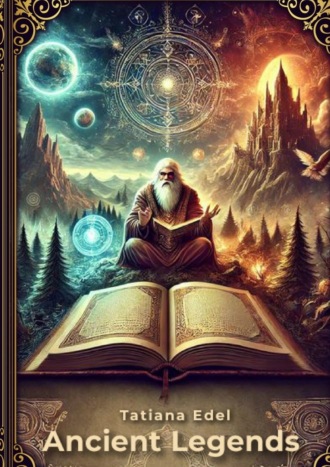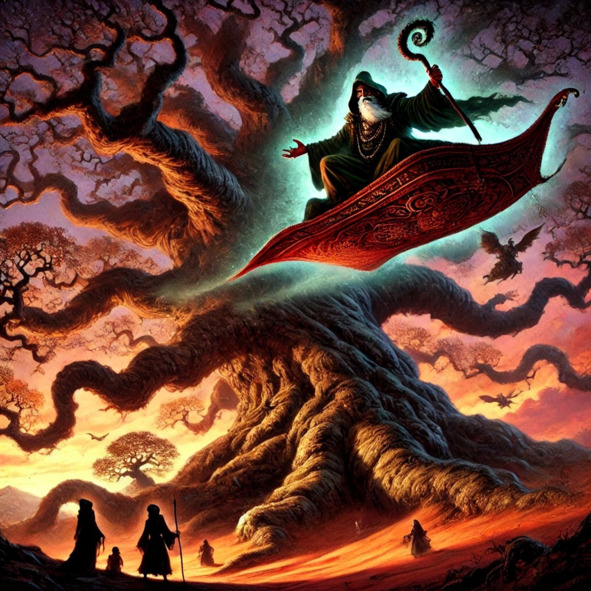
Полная версия
Ancient Legends
The royal heralds shouted the decree and rode off to spread the news. But the people, weakened by hunger and thirst to the point where they could barely walk, only shook their heads. If anyone knew where to find a spring, wouldn’t they have already done so?
In an Indian village, there lived a young man named Sadhir. Every day, he wandered beyond the village, pickaxe in hand, searching the fields and meadows, hoping to find a stream with life-giving water.
One day, he overheard the elders saying that a snake charmer could summon the rain. He asked if they knew where such a man lived. “Beyond the mountain pass,” they told him.
And so, despite his exhaustion, the young man set out to seek the charmer’s help. His journey was slow – he was weak, barely able to walk. He would rest for a while, then continue on. By the second day, he finally reached his destination.
He was shown the charmer’s house. Knocking at the door, he heard the sound of music. Entering the courtyard, he saw an old man in a turban playing a flute. Before him, a cobra had risen from a basket, swaying to the rhythm. The charmer was summoning the rain.
But suddenly, the snake collapsed lifelessly before their eyes. Women wailed in grief, and men wept. “Woe to us! Woe!”
“Let me help you find another snake,” Sadhir offered. “Can you train a new one quickly?”
“No, dear traveler,” the charmer sighed. “It is impossible. The snakes have fled far away from the Drought. And even if we were to find one, it would not survive even a single strike.”
“Why would you strike it?” the young man asked in surprise.
“Snakes are clever creatures. If you hit it with the flute once, it will learn to dodge the second blow. That is how we train them. The charmer waves the flute from side to side, the snake evades, and people think it is dancing. That is the secret.”
“Be patient,” Sadhir said. “I will find water.” And he hurried away.
Once more, he walked the land, digging and searching, hoping to find moisture beneath the earth. Along the way, he saw people desperately trying to summon rain. In one village, they sacrificed a black ram as an offering. In another, men lashed themselves with branches until they bled.
An old man told him of a belief in Slavic lands – that rain clouds were stolen by wicked toads. To stop them, people would capture a toad, place it under a clay pot, and beat the pot with sticks, chanting: “You wretched, slimy beast! Why have you done this evil? Release the rain clouds at once!” Frightened, the toad would supposedly release the rain. Others believed that destroying a raven’s nest could stop a drought.
But the bony old Drought only laughed from the heavens, locking the rain clouds away. Sadhir thought deeply and stopped believing in omens. Instead, he devoted himself even more to his search for water, pouring all his strength into the task.
One day, he met a beautiful young woman who was also searching for a well. They rejoiced in finding one another, and together, their journey felt lighter. At last, Fortune recognized their determination and opened her arms to them.
“Look,” Sadhir exclaimed. “That raven is pecking at the ground and scratching it like a hen. It must sense water nearby!”

“Let’s help it,” the girl cried, and together, they began to dig. Before long, the soil grew damp – they had found water. The moment the first well appeared, the wicked Drought lost her power, and from the heavens, long-awaited rain poured down upon the earth.
For three days and three nights, the rain fell, quenching the thirst of the land and its people. And as promised, the king rewarded the young man and woman with a palace, pastures, buffalo, and mountains of gold. But more than wealth, they found love, and so they married and lived happily in their grand home.
Such is the power of unwavering faith and the efforts of two hearts – together, they can bring happiness to all of humanity.
The Flying Carpet
The endless hills stretched wide. The meadow grass lay like a soft carpet. Mountain rivers rang with crystal-clear water. In those lands stood a city. Many people lived there, and there was enough space and work for all. The city was sheltered by tall mountains, and there had been no wars in those parts for so long that even the elders could not remember one. Though guards were posted every night, few truly worried. Sometimes, the city watchman would even drift into sleep, especially in the early morning hours when slumber was the sweetest.
On one such quiet morning, when the whole city slept, the young guard dozed off, feeling no danger.
And at that moment, across the clear sky, a flying carpet appeared. Upon it rode a wicked sorcerer named Karidur. He surveyed the hills, searching for a place to land. He despised people, oh, how he hated them! They never left him in peace, so he did all he could to harm them. Now he had decided to find himself apprentices. That was why he roamed the skies, looking and choosing. He was growing old, and the world was too vast for him to manage alone.
Karidur spotted a mighty oak, taller than any other, its massive branches reaching the sky, its roots twisting like serpents above the ground. He landed upon the very top of the tree, hidden within its thick canopy, unseen from below. Resting for an hour, he then transformed – under the bright morning sun – into a stooped old traveler, appearing as if he had come from far away, weary from his journey. He sat upon a stone to rest, sipped some water, and gazed at the city as if admiring it.
Soon, a group of boys rushed into the streets, playing a lively game of tag. One of them, a quick and clever lad named Gridya, was so fast that no one could catch him.
Ah, thought Karidur, this is the one I need.
Muttering an incantation under his breath, he disrupted the game, and then called the boy over.
.

“Oh, son, I have grown so old and weak. But you – so strong, so full of life! Will you help me reach that mighty oak? From there, I can manage on my own.”
Gridya had no wish to go anywhere, but his feet carried him forward against his will. He marveled at this but did not think much of it. Helping an old man was no great trouble. But as soon as they reached the tree, both of them vanished without a trace, as if they had never been there at all.
The other children gasped in horror and ran home to deliver the terrible news. Gridya’s mother screamed, and his father wept – where could they search, where could they find their son?
But Karidur had already flown to his gloomy fortress. His gray, menacing palace stood atop the highest blue mountain, where even the wind rarely reached. Wrapped in eternal mist, shrouded in half-light, it filled the earth below with dread.
At first, Gridya had enjoyed the flight on the magic carpet. But once they landed, all joy vanished. The palace was wretched – dark halls, bats flitting through the shadows. Karidur rubbed his hands together in glee, expecting praise from his guest. But Gridya was silent. He could not yet grasp where he had been taken.
The sorcerer decided to show off his tricks, the only thing he truly excelled at. With a wave of his hand, he transformed a bat into a piglet. The tiny creature ran in frantic circles, squealing in confusion.
Gridya burst into laughter, chasing the piglet around the hall, teasing it.
“Shall I show you more wonders?” Karidur asked. “Or do you believe I can do anything?”
“Then make a table appear, filled with every sweet in the world!” Gridya demanded.
The sorcerer smirked, whispered a spell, and – bam! – before them stood a massive table, stacked high with treats. Everything was there except living water.
Gridya grabbed the candies, devoured the honey by the spoonful, and stuffed his mouth with nuts and pastries. He could not stop – his belly was fit to burst.
Karidur chuckled. Good, he thought, the boy is greedy – he will make a fine villain.
At last, Gridya grew drowsy and asked to sleep. That was exactly what Karidur wanted. Let him sleep while I fly off to find another, he thought.
So, the sorcerer mounted his flying carpet once more. This time, he flew by night, knowing the guards would now watch the skies closely, ready to shoot down any intruder with a well-aimed arrow before he could cast a spell.
Karidur darkened the night, summoning thick gray clouds to cover the sky. “You will not see my carpet, no matter how hard you look,” he sneered. The watchmen failed to notice him. And so, Karidur stole another boy, this time disguised as an old woman.
This continued for five nights. The elders of the city gathered beneath the ancient oak tree. By old tradition, people had always held festivals and important councils around this very tree. They thought all day and into the evening before making a decision. They would go to Mikula Selyaninovich, the mighty hero, and beg for his help to find the villain and destroy him.
Mikula Selyaninovich was a giant of a man, plowing the hills and fields, sowing wheat, unaware of the terrible events unfolding. He was tall as a tower, broad-shouldered, his eyes sharper than a falcon’s, his hair curling in golden waves, his brows as dark as the night. And his strength? He handled his great plow with ease, as if it were a child’s toy.
The elders came to him, told him of their sorrow. The children must be saved, and the sorcerer’s fortress destroyed – who knew what greater evil he might unleash? Mikula Selyaninovich was not a man of many words. He furrowed his brow, sighed, bowed to the elders, and began preparing for battle. Though he did not know where to go, he trusted his steed to find the way. And so, it did.
Meanwhile, Karidur was busy. He trained the boys in sorcery and cruelty, molding them into his wicked apprentices. But one boy resisted – a thin, red-haired, quiet lad named Afanasiy. Karidur had seen him earlier, bullied by other children. He had assumed that Afanasiy, out of bitterness and a thirst for revenge, would be easy to turn. He was wrong. At first, Afanasiy refused to take part. Then he pretended to learn, outshining even the others in skill.
At night, while the boys lay down to sleep, he whispered old tales to his two closest friends – stories his grandmother had told him, where good always triumphed. He was building a secret alliance, planning their escape.
Karidur drugged the children with his “sleep-root tea,” making them forget their homes and love eternal darkness.
Afanasiy and his friends poured their tea away and warned the others, but Gridya refused to listen.
For three days and nights, the mighty warrior Mikula Selyaninovich rode tirelessly over mountains and hills without rest. Only by the evening of the third day did his faithful steed carry him to the sorcerer’s castle. He decided to wait for nightfall and assess the situation. He circled the castle from all sides – there was no way in. But hiding was no task for a warrior. At dawn, he mounted his loyal steed, donned his sturdy chainmail, took his steel sword in hand, and called out, challenging the sorcerer to an honest fight
Why would Karidur need an honest fight? He wasn’t used to putting his life in danger for nothing. Let me just turn him into a chick and eat him myself, he thought. He began to cast spells, hissing and chanting – but nothing happened. His magic had no effect on the Russian warrior.
Again, Mikula Selyaninovich called out, again he challenged him to battle. The sorcerer grew furious. What is this? Some peasant dares to yell at me? Just wait until I step outside – he’ll die of fright at the mere sight of me. I’ll give myself ten hands, each one holding a sword. And as for those boys, I won’t give them up! I’ll lock them in the deepest dungeon, where no one will hear them, no one will find them.
So, he did as he said. But when the warrior called for the sorcerer a third time, Karidur finally stepped into the bright light, ten swords in ten hands. Yet our warrior did not flinch. His mighty steed galloped straight at the wicked man. Mikula Selyaninovich swung his steel sword – four of the sorcerer’s hands vanished in an instant.
Karidur raged and transformed into a flying serpent, breathing fire, ready to burn the warrior to ash. They fought long and fiercely, battling not for life, but for death. The hero’s steed began to stumble, and the sorcerer’s voice grew hoarse, barely a whisper. Then Mikula Selyaninovich gathered all his strength, found an opening, and struck – cutting off the villain’s head. He sat down on his native land to catch his breath, his steed standing beside him, snorting from exhaustion.
Once they had rested, they set out to find the children. But they were nowhere to be seen, nowhere to be heard. They searched every corner of the palace – no trace of them, not even a footprint. The warrior called them by name, but no one answered.
“Well then, we’ll have to take this palace apart – they must be here somewhere,” said Mikula Selyaninovich. He pressed his hands against the high walls and threw them far aside, one after another. In less than an hour, they stood in an open field, all that remained of the palace now nothing but ruins. The warrior grew sorrowful, but his steed wouldn’t move, standing still as if sensing something.
Mikula Selyaninovich understood – he needed to search right there. He crafted a sturdy shovel and began digging, strip by strip, beneath the castle ruins. Soon, a hatch appeared, with a metal ring on the lid. He pressed his ear against it – was there another evil lurking below? But inside, there was only banging and shouting. The boys were trying to escape into the light of day! Mikula Selyaninovich beamed with joy. He opened the hatch and pulled them all out. Oh, what happiness it was!
And so they set off for home, bringing good news – no more evil sorcerer, and all the children were safe and sound, returned to their joyful parents. People later told stories that Athanasius grew up and became the one who invented the flying carpet. There would have been no happiness, if not for misfortune!
The Guardians of the Desert
In an Altai village, there once lived a greedy man. Whatever he saw, he dragged home. His house was already overflowing with things, yet still, he hoarded more. His wife scolded him, but he paid no heed.
One day, he brought home a stone woman – a great, ancient statue. He hitched up his horse, tied the statue with ropes, and dragged it all the way to his yard. He stood before it, pleased with himself. The stone woman gazed at him with silent reproach, as if saying, why have you moved me? I belong in the open fields, under the free wind.
But the foolish man had another idea. He began sharpening his knives against the statue, boasting to all: “Now I have a stone woman at home, holding a chalice and a sword. No one will dare touch me! She will guard my wealth and bring me even more riches!”
Yet soon, he noticed something strange. Each night, the statue seemed to move – just a little. Three days ago, she had been in the farthest corner of the yard. Today – look! – she was already near the gate. At first, he could not believe his eyes, but it was true. She was leaving. Then, one morning, she was gone entirely.
The man flew into a rage! “I’ll harness my strongest horse, drag her back, and chain her down so she never runs away again!” Just as he thought this wicked plan, an old traveler entered his yard, led by a young boy as his guide. “We beg you,” said the old man, “give us a little water.” But the greedy man shouted at them, chasing them away. Yet the old traveler did not move. He stood still, like the stone woman herself.
The wife took pity on them. She brought out a slice of bread and a cup of water. The old man drank, broke off a piece of bread, and spoke:
“I have heard what you have done. You took the stone woman from her place and offended her by grinding your knives upon her.

She was not placed in the steppe by you, nor was she meant for your selfish needs. She is the Sacred Guardian of the Chalice. For centuries, she granted strength and protection to warriors, and in return, they offered sacrifices – rams, and even human lives – to earn her favor. She has watched over the steppe for ages. Now… I do not know what will happen. But I fear a great disaster is coming. And you will be to blame. Look! The ravens have gathered, circling above your village. They wait for their sacrifice. If you have any sense, if you have any conscience left – go, find her, and beg for forgiveness!”
Having spoken, the old traveler continued on his way.
“I won’t go anywhere,” the man muttered. “Nonsense! She’s just a statue – what can she do?” Still, he abandoned his plan to drag her home again.
The next morning, a terrible wind arose. A dust storm swept across the land, carrying sharp thorns from the steppe. The animals went blind, howling and bellowing in pain. The villagers wrapped their faces in cloth, desperately trying to lead their herds into the barns, but the gates were torn apart by the raging storm. They say, when trouble comes, throw open the gates.
Well, the gates had opened themselves. His wife wept. “Go to her! Beg for her forgiveness!” she pleaded. At last, fear took hold of him. He wrapped his face, took a staff for support, and walked into the storm. He wandered for hours, growing weak. The statue was nowhere to be seen. At last, he reached the mountains and began to climb, believing that a sacred force was guiding him.
The wind began to ease. The dust grew thinner.
He loosened his cloth slightly and saw the deepest blue sky, the snowy peaks, and – far in the distance – a man standing, releasing red paper horses into the wind. The man rejoiced, sensing that these horses would lead him to his path. He ran after them, as fast as he could. Before he knew it, he was back in the steppe. And there – the red paper horse landed directly in the stone woman’s chalice.
He fell to his knees before her. “Forgive me!” he begged. The stone woman said nothing. Did she forgive him? Or not?
“Enough of this,” he thought. “I won’t grovel before a lifeless rock.” He turned to leave. At that moment, a whirlwind of dust and darkness surrounded him. He fell to the ground, pleading again. The storm calmed.
For ten days, he remained by the statue’s side. He grew weaker and weaker. At last, the villagers came to his aid. They stood in a circle around the statue, offering prayers for protection, for blessing upon their land, and giving thanks for her strength and watchful gaze.
The Guardian of the Chalice released them in peace. And the greedy man? She taught him a lesson he would never forget:
Do not mock the sacred. And when you have sinned, learn to repent.
The Victorious Buddha
Do you know who Buddha is? Let me tell you about him.
Long ago, two and a half thousand years ago, a long-awaited son was born to an Indian raja and Queen Mahamaya – a noble heir to the Shakya clan. They named him Siddhartha Gautama. The royal couple’s joy knew no bounds. But on the seventh day after his birth, the queen passed away.
The king grieved deeply and feared for his son’s future. He summoned the most renowned astrologer to predict the child’s fate. The scholar studied the stars for a long time, drawing lines on paper, then finally spoke:
“The prince possesses extraordinary qualities. If he is allowed to grow freely and experience life in its fullness, he will become a great Enlightened One – a Teacher to millions.”
“But I need an heir – a protector of my kingdom, not a spiritual teacher!” the king retorted angrily.
“Then you must shield him for as long as possible from the realities and sufferings of human life,” the astrologer advised.
The king immediately issued a decree: “Until the prince turns twenty, he shall not leave the royal palace!” And so, Siddhartha grew up in luxury and peace, unaware of human sorrow or misfortune. When he turned twenty, the gates of the palace were finally opened so he could see the world in all its diversity.
Curious, the prince eagerly explored the unknown world, until he suddenly stopped in astonishment. A hunched old woman, wrapped in rags, hobbled toward him, leaning on a staff.
“Who is that?” he asked.
“That is old age,” they told him.
“Does it come to everyone?” the young man asked in horror.
“Yes, such is life,” his servant replied.
On the next street, they came across a man locked in a pen, sitting alone, his face disfigured.
“And who is this?” the prince asked. “Why is he imprisoned?”
“This man suffers from a terrible disease. He was isolated so he wouldn’t infect others. Leprosy is slowly eating away at his face,” they answered.
“What else do I not know?” the prince wondered.
As if in silent response, a funeral procession appeared at the end of the road.
“Where are these people going?” Siddhartha asked.
“They are taking the deceased to the cemetery for burial.”
“Does this fate await everyone?” the prince exclaimed in horror.
“Yes, such is life,” they answered again.
A great shadow seemed to fall over Siddhartha’s heart. He returned to the palace, locking himself away for many months, lost in thought. Fearing his son’s unpredictable actions, the king ordered his immediate marriage. Siddhartha obeyed his father’s will and married a beautiful woman. A few years later, they had a son.
But even as a husband and father, Siddhartha felt restless.
At twenty-nine, he left his home behind, setting out on a journey to find true, unending happiness. For the last time, he gazed upon his baby son, then dressed in simple robes, shaved his head, and left the palace forever. He wandered from city to city, from village to village, but Enlightenment did not come. He decided to fast – to abandon food completely. Soon, his body was nothing but skin and bones.
Конец ознакомительного фрагмента.
Текст предоставлен ООО «Литрес».
Прочитайте эту книгу целиком, купив полную легальную версию на Литрес.
Безопасно оплатить книгу можно банковской картой Visa, MasterCard, Maestro, со счета мобильного телефона, с платежного терминала, в салоне МТС или Связной, через PayPal, WebMoney, Яндекс.Деньги, QIWI Кошелек, бонусными картами или другим удобным Вам способом.

